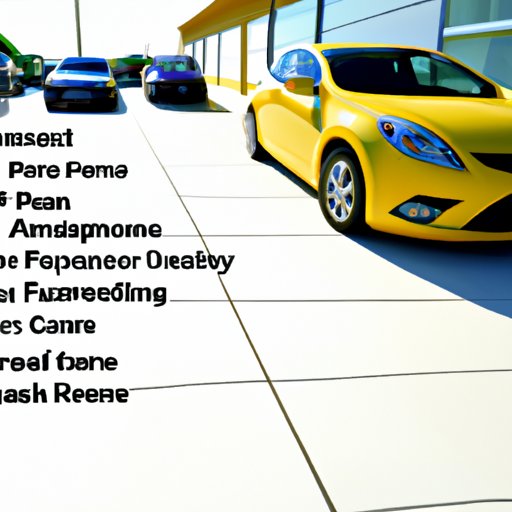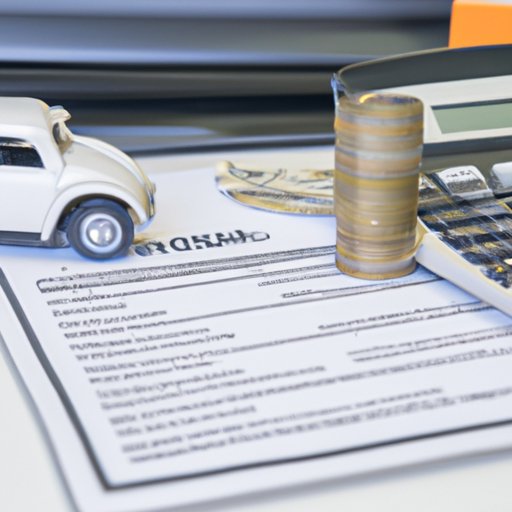Introduction
When it comes to buying a car, there are two primary options: leasing and financing. Leasing involves making payments on a vehicle for a set period of time without taking ownership of the vehicle, while financing involves making payments toward owning the vehicle. Each option has its own advantages and disadvantages, so it’s important to understand the differences between leasing and financing before making a decision.
Comparing the Pros and Cons of Leasing vs Financing a Car
Leasing and financing offer different benefits and drawbacks, so it’s important to weigh the pros and cons of each option before deciding which one is right for you.
Advantages of Leasing
Leasing offers several advantages, including:
- Lower monthly payments: Since you’re not paying to own the car, your monthly payments are usually lower than they would be if you were financing the car.
- No long-term commitment: With a lease, you’re only committed to making payments for the length of the lease agreement. There’s no need to worry about selling the car when you’re done with it.
- More flexibility: At the end of a lease term, you can choose to buy the car, turn it in for a new lease, or just walk away. This gives you more flexibility than if you were financing the car.
- Tax incentives: Depending on where you live, you may be able to take advantage of certain tax incentives when leasing a car.
Disadvantages of Leasing
While leasing offers many benefits, there are also some drawbacks to consider, such as:
- Mileage restrictions: Most leases come with mileage restrictions, so you’ll have to pay extra if you exceed the limit.
- Higher long-term costs: While your monthly payments may be lower with a lease, you’ll end up paying more in the long run since you won’t own the car at the end of the lease term.
- Early termination fees: If you decide to end your lease early, you may be responsible for paying an early termination fee.
Advantages of Financing
Financing a car also offers several advantages, such as:
- Ownership of the car: When you finance a car, you own it once the loan is paid off. This means you can do whatever you want with the car, including selling it or trading it in for a new one.
- No restrictions on usage: Unlike with a lease, you won’t have to worry about mileage restrictions or other usage rules when you finance a car.
- Potentially lower long-term costs: If you keep the car for a long time, you may end up paying less than you would with a lease since you won’t have to make payments forever.
Disadvantages of Financing
Financing a car also comes with some drawbacks, such as:
- Higher monthly payments: Since you’re paying to own the car, your monthly payments will likely be higher than they would be with a lease.
- Long-term commitment: When you finance a car, you’re committing to making payments for the entire life of the loan. This can be a major drawback if your circumstances change and you need to get out of the loan.
- Loss of value over time: Cars depreciate in value over time, so you may end up owing more on the car than it’s worth if you keep it for a long time.

Exploring the Financial Benefits of Leasing vs Financing a Car
When deciding between leasing and financing a car, it’s important to consider the financial benefits of each option. Here’s a look at how leasing and financing can save you money:
How Leasing Can Save Money
Leasing can be a great way to save money if you’re looking for a short-term solution. Since you’re not paying to own the car, your monthly payments will usually be lower than they would be if you were financing the car. Additionally, since most leases come with mileage restrictions, you won’t have to worry about racking up too many miles and having to pay extra for them.
How Financing Can Save Money
Financing a car can also be a great way to save money, especially if you plan to keep the car for a long time. If you’re able to get a low interest rate on your loan, you could end up paying less for the car than you would with a lease. Additionally, you won’t have to worry about mileage restrictions or other usage rules, so you can use the car however you want without worrying about additional fees.
Determining if Leasing or Financing a Car Makes More Sense for Your Situation
When deciding whether to lease or finance a car, there are several factors to consider, such as your budget, your needs, and your credit score. Here’s a look at how these factors can help you determine which option is best for you:
Your Budget
The first factor to consider when deciding between leasing and financing a car is your budget. If you have a limited budget, leasing may be the better option since you’ll have lower monthly payments. On the other hand, if you have more money to work with, financing may be the better option since you’ll have the potential to save money in the long run.
Your Needs
It’s also important to consider your needs when deciding whether to lease or finance a car. If you need a car for a short period of time, leasing may be the better option since you won’t have to worry about a long-term commitment. On the other hand, if you plan to keep the car for a long time, financing may be the better option since you’ll own the car at the end of the loan term.
Your Credit Score
Your credit score is also an important factor to consider when deciding whether to lease or finance a car. If you have a good credit score, you may be able to get a better deal on a loan than you would with a lease. On the other hand, if you have bad credit, leasing may be the better option since you won’t have to worry about getting approved for a loan.

Understanding the Tax Implications of Leasing vs Financing a Car
Another important factor to consider when deciding between leasing and financing a car is the tax implications of each option. Here’s a look at the tax deductions available for leasing and financing a car:
Tax Deductions for Leasing
If you lease a car, you may be able to take advantage of certain tax deductions, such as deductions for sales tax and personal property tax. Additionally, depending on where you live, you may be able to deduct a portion of your lease payments from your taxes.
Tax Deductions for Financing
When you finance a car, you may be able to take advantage of certain tax deductions, such as deductions for interest paid on the loan. Additionally, depending on where you live, you may be able to deduct a portion of your loan payments from your taxes.
Examining the Long-Term Costs of Leasing vs Financing a Car
When deciding between leasing and financing a car, it’s important to consider the long-term costs of each option. Here’s a look at how the two options compare when it comes to depreciation and interest costs:
Comparing Depreciation Costs
Leasing and financing both come with depreciation costs, but the costs can vary depending on the length of the lease or loan term. With a lease, you’ll only have to pay depreciation costs for the length of the lease term, while with a loan, you’ll have to pay depreciation costs for the entire life of the loan.
Comparing Interest Costs
Interest costs can also vary depending on the type of loan you get and the length of the loan term. With a lease, you won’t have to worry about interest costs since you’re not borrowing money to buy the car. With a loan, you’ll have to pay interest on the amount you borrow, so it’s important to shop around for the best deal.
Looking at the Insurance Requirements of Leasing vs Financing a Car
When deciding between leasing and financing a car, it’s important to consider the insurance requirements of each option. Here’s a look at the coverage requirements for leasing and financing a car:
Coverage Requirements for Leasing
When you lease a car, you’ll usually be required to carry full coverage auto insurance, which includes liability, collision, and comprehensive coverage. Additionally, you may be responsible for covering any damage to the car that exceeds the amount of the lease agreement.
Coverage Requirements for Financing
When you finance a car, you’ll typically be required to carry liability insurance to cover any damage you cause to other people or property. Additionally, you may be required to carry collision and comprehensive coverage if your lender requires it.

Finding the Right Dealership to Get the Best Terms on Leasing or Financing a Car
When it comes to leasing or financing a car, it’s important to find the right dealership to get the best terms. Here’s what you should do to ensure you get the best deal:
Researching Dealerships
Before you start shopping for a car, it’s important to research different dealerships to see which ones offer the best terms. Look at reviews online and talk to friends and family to get an idea of which dealerships offer the best deals.
Comparing Offers
Once you’ve narrowed down your list of dealerships, it’s time to start comparing offers. Make sure to compare the terms of the lease or loan, the interest rates, and any other fees associated with the deal.
Conclusion
Deciding whether to lease or finance a car can be overwhelming, but it doesn’t have to be. By understanding the pros and cons of each option, exploring the financial benefits and tax implications, and understanding the long-term costs, you can make an informed decision about which option is best for you. Additionally, by finding the right dealership, you can ensure you get the best terms on your lease or loan.
(Note: Is this article not meeting your expectations? Do you have knowledge or insights to share? Unlock new opportunities and expand your reach by joining our authors team. Click Registration to join us and share your expertise with our readers.)
